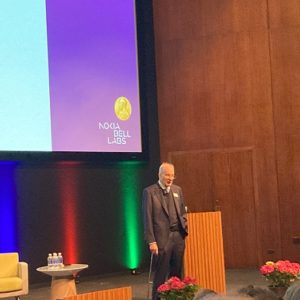Opinion: As a Wellness Option, NJ Tech Companies Could Consider Biohacking

What New Jersey technology employer wouldn’t want employees who are focused, cool warriors by day and get restful, restorative sleep at night?
Protecting health and preventing disease to optimize performance in both professional and personal lives: This is the goal of biohacking.
The term “biohacking” has been popularized by tech entrepreneur Dave Asprey and embraced by the tech community. He defines biohacking as “the desire to be the absolute best version of ourselves … a systems-thinking approach to our own biology.” I like to think of it as hiring yourself as the CEO of your own health: considering everything that works, then finding the combination of strategies and tools that work best for you.
Many emerging companies are offering perks to help recruit and retain employees while offsetting workplace situations that often involve long hours of sedentary work in front of a screen, with loads of pressure and stress thrown in.
While generous time-off policies and yoga classes are among the perks offered by employers, biohacking goes deeper, to the core of health. Some biohacks that can be incorporated into the workplace include: optimized lighting to more closely mimic natural sunlight, infrared saunas to help relax and detoxify the body, brain rebalancing with neurofeedback, whole body vibrational plate training to combat the effects of prolonged sitting and the distribution of information about swaps to replace drugs with safe and effective nutritional supplements.
These may seem like futuristic offerings, but they are available now.
Recently, a group of men and women rowers at the Penn Athletic Club Rowing Association, in Philadelphia, coached by three-time Olympian M. Sean Hall, participated in a trial of Microcurrent Neurofeedback. This form of “brain training” was added to their rigorous physical training schedule. These elite-level athletes, striving to represent the U.S. in the World Games and then in the Olympics, train more than 20 hours per week, often while holding down full-time jobs and/or pursuing graduate degrees. Describing them as highly pressured both physically and mentally is an understatement. They received two sessions of Microcurrent Neurofeedback per week for five weeks. The results were impressive.
The top four benefits reported by the rowers were a calming down of performance anxiety and improved focus, sleep and energy. One of the rowers remarked after his early morning session, “I didn’t notice anything immediately, but I went home and worked on things and was extremely productive the rest of the day. I noticed things seemed a little clearer and my focus was much improved.” Can employers achieve the same results from this form of biohacking? Absolutely. Microcurrent Neurofeedback can benefit anyone looking to improve his or her mental game.
As biohacking involves both preserving and restoring health, there is no stigma for employees who biohack at work. For example, one employee can use neurofeedback to help build resilience and manage overwhelming stress, while another could use the same neurofeedback technology to help optimize performance for an upcoming mission-critical meeting. Anyway, no one needs to know.
This is a significant innovation, considering that workplace stress is the most common work-related health complaint. Employees can learn to biohack their stress, and employers can provide them with the means, thus leading the way to a major advance in health and wellness benefits. But beware, a potential side effect of offering biohacking services may be reduced health care costs!
The author is Linda Edwards, RN, MSN, biohacker and president of ResilientMe BioHacking Studio, Rumson and Asbury Park, N.J. She can be reached at 732-319-3949.

